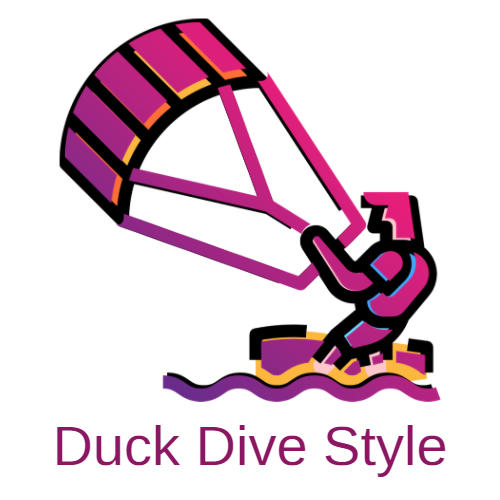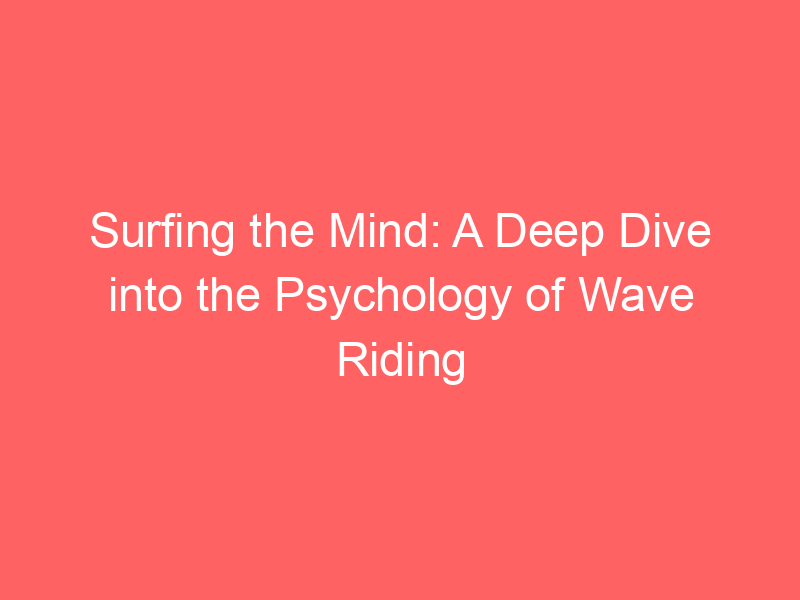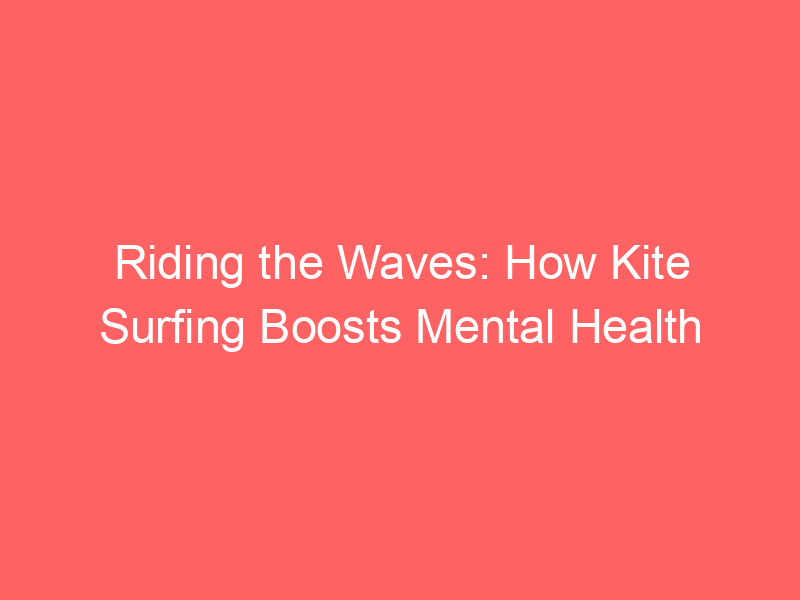
Introduction to Surfing Psychology
Surfing is not just a physical activity; it’s a mental journey too. It’s about understanding the connection between your mind and the water, and exploring the mental waves in surfing. In this section, we will delve into the fascinating world of surfing psychology.
- Understanding the connection between mind and water
- Exploring the mental waves in surfing
When we talk about surfing, we often focus on the physical aspects – the balance, the strength, the agility. But there’s another aspect that’s just as important, if not more so – the mental connection. When you’re out on the water, you’re not just riding the waves; you’re connecting with them. You’re becoming one with the water, and that requires a deep mental connection. This connection can be a source of calm and tranquility, helping to reduce stress and anxiety. It’s a unique aspect of surfing that sets it apart from other sports.
Just like the ocean has waves, so does our mind. And just like a surfer rides the waves of the ocean, we can learn to ride the waves of our mind. This is what we call the ‘mental waves’ in surfing. It’s about understanding our thoughts and emotions, and learning to navigate them, just like a surfer navigates the waves. It’s about developing mental resilience and flexibility, which can help us in all areas of our life. The mental waves in surfing are a fascinating area of study, and one that can provide valuable insights into the human mind.
In the following sections, we will delve deeper into the mental benefits of surfing, the psychology of sports with a closer look at surfing, and the relationship between mental health and surfing. So, let’s ride the mental waves together!
The Mental Benefits of Surfing
Surfing is not just a sport, it’s a lifestyle that can significantly improve your mental health. Let’s dive into the physical and emotional benefits of surfing.
Physical and Emotional Benefits
Surfing is a full-body workout that engages both the mind and body. It offers numerous physical and emotional benefits.
- How surfing impacts physical health
- Emotional benefits of surfing
Surfing is a great way to stay in shape. It works out your entire body, improving cardiovascular fitness, muscle tone, balance, and flexibility. It also helps burn calories. According to a Wikipedia study, an hour of surfing can burn up to 250 calories. This physical activity also releases endorphins, the body’s natural painkillers, giving you a sense of wellbeing and happiness.
Surfing is also beneficial for your emotional health. It helps reduce stress and anxiety by focusing your mind on the present moment. The rhythmic pattern of the waves and the concentration required to ride them can have a calming effect, similar to meditation. Moreover, the sense of achievement you get from catching a wave can boost your self-esteem and confidence.
So, whether you’re a seasoned surfer or a beginner, the physical and emotional benefits of surfing are undeniable. It’s a fun and exciting way to improve your overall health and wellbeing.
Cognitive Benefits of Surfing
Surfing, beyond its physical and emotional benefits, also offers significant cognitive advantages. Let’s explore these benefits in more detail:
- Enhanced Focus and Concentration
- Improved Decision-Making Skills
- Boost in Creativity
Surfing requires a high level of focus and concentration. As you ride the waves, you need to pay close attention to the changing conditions of the ocean and adjust your actions accordingly. This constant need for focus can help improve your concentration skills, not just while surfing, but also in other areas of your life. A study found that regular surfers tend to have better focus and concentration than non-surfers.
When you’re on a surfboard, you need to make quick decisions based on the wave’s size, direction, and speed. This constant decision-making process can help improve your ability to make quick and accurate decisions, even in high-pressure situations. According to a research, surfers often exhibit better decision-making skills compared to non-surfers.
Surfing is not just about riding waves; it’s also about expressing yourself on the water. The freedom and creativity involved in choosing your path on a wave can lead to a significant boost in your creative thinking skills. Many surfers report feeling more creative and innovative after a surfing session. A study even suggests that engaging in activities like surfing can stimulate creativity.
In conclusion, surfing offers a wide range of cognitive benefits, including enhanced focus, improved decision-making skills, and a boost in creativity. So, the next time you hit the waves, remember that you’re not just having fun; you’re also boosting your brain power!
Psychology of Sports: A Closer Look at Surfing
Surfing is not just a physical sport, it’s a mental game too. In this section, we delve into the psychology behind surfing. We’ll explore the mindset of a surfer and how this sport can shape one’s mental resilience.
Understanding the Surfing Mindset
What goes on inside a surfer’s mind? Let’s take a closer look.
- The role of mindfulness in surfing
- Developing resilience through wave riding
Surfing requires a high level of concentration and presence. It’s about being in the moment, feeling the wave, and reacting to it. This is where mindfulness comes in. Mindfulness is the practice of focusing one’s attention on the present moment. In surfing, it’s about being fully aware of your surroundings, your body, and the wave. It’s about letting go of distractions and immersing yourself in the experience. This is why many surfers describe surfing as a form of meditation.
Surfing is unpredictable. Waves can change in an instant, and surfers must adapt quickly. This unpredictability can be challenging, but it also helps surfers develop resilience. Each wave is a new challenge, a new opportunity to learn and grow. When a surfer falls off a wave, they don’t give up. They get back on their board and try again. This resilience can be applied to other areas of life, helping surfers overcome obstacles and bounce back from setbacks.
In conclusion, the surfing mindset is about mindfulness and resilience. It’s about being in the moment, embracing challenges, and learning from failures. This mindset can have positive effects on a surfer’s mental health and overall well-being.
Psychological Aspects of Surfing
Surfing is not just a physical sport, it also involves a significant psychological component. Let’s delve into two key psychological aspects of surfing: overcoming fear and the role of motivation and passion.
The Fear Factor: Overcoming Anxiety in the Surf
Surfing, especially for beginners, can be a daunting experience. The fear of the unknown, the powerful waves, and potential dangers can cause anxiety. However, overcoming this fear is an integral part of the surfing journey.
According to a Wikipedia article, many surfers use techniques such as deep breathing, visualization, and positive self-talk to manage their fear. These techniques not only help surfers overcome anxiety but also improve their overall performance.
For instance, Australian professional surfer, Mick Fanning, has openly talked about his fear of sharks and how he has used psychological techniques to overcome it. This shows that even the best surfers can experience fear, but the key is learning how to manage it.
The Role of Motivation and Passion in Surfing
Passion and motivation are crucial in surfing. They drive surfers to wake up early, endure physical discomfort, and persist in the face of challenges. Without a deep love for the sport and a strong motivation to improve, it would be difficult to progress in surfing.
A Wikipedia entry on surfing culture highlights that the sport is often seen as a lifestyle, not just a hobby. This passion is what fuels surfers to keep going, even when the waves are tough.
Take the example of Bethany Hamilton, a professional surfer who lost her arm in a shark attack. Her passion for surfing motivated her to return to the sport, and she has since won numerous surfing competitions. This is a testament to the power of motivation and passion in surfing.
Mental Health and Surfing
Surfing is not just a sport, it’s a therapy. The connection with nature, the physical exertion, and the thrill of riding a wave can have profound effects on mental health. Let’s delve deeper into how surfing can be a therapeutic tool for mental health recovery.
Surfing as Therapy
Surfing can be a powerful form of therapy. It’s not just about the physical activity, but the mental and emotional benefits that come with it. Let’s explore how surfing can aid in mental health recovery and some case studies of surfing therapy.
- How surfing can aid mental health recovery
- Case studies of surfing therapy
Surfing can help improve mental health in several ways. The physical activity releases endorphins, the body’s natural mood boosters. Being in nature and the ocean can help reduce stress and anxiety. The focus required to surf can also provide a distraction from negative thoughts and feelings. Plus, the sense of achievement from catching a wave can boost self-esteem and confidence.
There are numerous case studies that highlight the effectiveness of surfing as therapy. For instance, a study published in the Journal of Clinical Psychology found that participants who took part in a surfing program showed significant reductions in symptoms of depression and PTSD. Another study in the American Journal of Occupational Therapy found that surfing could improve the social skills and self-esteem of children with autism.
In conclusion, surfing is more than just a sport. It’s a form of therapy that can help individuals cope with mental health issues and improve their overall well-being. So, why not give it a try? You might just catch a wave of happiness.
Surfing and Stress Relief
Surfing, a popular water sport, is not just about riding the waves. It also offers significant benefits for mental health, particularly in managing stress. Let’s explore how surfing can help alleviate stress and what scientific studies say about this.
- How Surfing Helps Manage Stress
- Scientific Studies on Surfing and Stress Reduction
Surfing is a physical activity that requires focus and concentration. When you’re surfing, you’re in the moment, paying attention to the waves and your movements. This mindfulness can help divert your mind from stressors, giving you a mental break and helping you feel more relaxed and refreshed.
Moreover, surfing triggers the release of endorphins, the body’s natural mood lifters. These chemicals can help reduce stress levels and promote a sense of well-being. The rhythmic motion of the waves and the calming effect of being in nature also contribute to stress relief.
Several studies have investigated the link between surfing and stress reduction. A 2010 study found that surfers reported lower levels of stress and tension compared to non-surfers. They also exhibited lower heart rates and blood pressure, indicating a more relaxed state.
Another study in 2014 revealed that surfing could significantly reduce symptoms of depression and anxiety, both of which are closely related to stress. The participants reported feeling happier and more peaceful after surfing sessions.
In conclusion, surfing is more than just a sport or a hobby. It’s a powerful tool for stress management, backed by scientific evidence. So, the next time you feel stressed, why not try catching some waves? It might just be the stress relief you need.
Conclusion: Riding the Mental Waves
As we reach the end of our journey through the psychology of surfing, it’s time to reflect on the key insights we’ve gathered and look ahead to what the future might hold for this fascinating field of study.
- Key takeaways on the psychology of surfing
Surfing is not just a physical activity; it’s a mental challenge that requires focus, resilience, and a deep connection with nature. The mental benefits of surfing are numerous, from stress relief and improved mood to increased self-esteem and personal growth. The psychology of surfing is a complex interplay of emotions, thoughts, and behaviors, shaped by factors such as the surfer’s personality, the surfing environment, and the unique dynamics of the sport itself.
Surfing can also serve as a powerful tool for mental health, helping individuals cope with issues like anxiety and depression. The therapeutic potential of surfing is increasingly being recognized, with programs like surf therapy gaining popularity around the world.
- Future directions for research in surfing psychology
While we’ve learned a lot about the psychology of surfing, there’s still much to explore. Future research could delve deeper into the mental processes involved in surfing, examine the long-term effects of surfing on mental health, and investigate the effectiveness of surf therapy in different populations.
There’s also a need for more interdisciplinary research, bringing together experts from fields like psychology, sports science, and environmental studies. By combining different perspectives, we can gain a more holistic understanding of surfing and its impact on the human mind.
In conclusion, the psychology of surfing is a rich and exciting area of study, offering valuable insights into the human mind and promising avenues for future research. As we continue to ride the mental waves, we can look forward to new discoveries and deeper understanding of this captivating sport.








